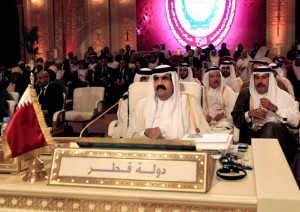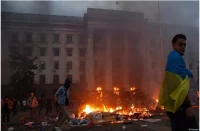The recent Arab League summit, which illegally decided to provide military aid to the Syrian opposition under pressure from Doha, has once again demonstrated that there is a new power balance in the Arab world where the traditionally powerful countries like Egypt, Algeria and Iraq have again proved helpless against the wealthy dwarf Qatar. The emirate used every means at its disposal to get what it wanted, including financial blackmail. Even Saudi Arabia showed less perseverance than Qatar.

Doha has obviously become extremely disillusioned with the survivability of Syria’s legitimate government, which has held out for more than two years despite the active external pressure aimed at removing the Assad regime from power and the foreign military assistance provided to the armed Syrian opposition, which Doha has generously funded. Qatar has already spent so much money that it has put on hold a number of domestic development projects, and foreign investments in the country have significantly fallen off.
E.g. the Emir has not fulfilled his promises to participate in several major Russian projects that he made during his November 2010 visit to Moscow. The question arises — is it because money is lacking, or is Qatar getting back at Russia for its stance on Syria? The main reason, of course, is the latter. After all, in November 2011 the Russian ambassador was attacked in Doha airport in an attempt to take his diplomatic pouch because he had antagonized the local Wahhabis by too energetically defending his country’s position in the local media. Qatari objective is clear: they try to put an end to the Syrian regime blocking a gas pipeline project from Qatar to Turkey via Saudi Arabia, Jordan and the UAE, and then to European consumers. It would have helped realize a strategic objective — squeeze Russia out of its traditional markets for natural gas in Southeastern and Eastern Europe, as well as in Turkey. And Doha is not doing it just on its own accord; US pressure has been brought to bear.
After all, the Emirate can hardly be considered a state in the classical sense. It is actually a large natural gas field that is dominated by US-based Exxon Mobil and the largest US Air Force base in the Middle East, which has almost 5000 US military personnel, i.e., almost half as many as are in the Qatari Armed Forces. How much independence has Qatar in reality? Moreover, the Emir and his family are caught on Washington’s hook. After all, the Emirate had previously been listed as a state sponsor of terrorism, and it was only taken off the list because it allowed its territory to be used in the war against Iraq. But many members of the Emir’s family openly supported the terrorists who carried out the attacks in New York and Washington on September 11, 2001. Indeed, the legitimacy of the Emir himself is questioned by almost half of the members of the Al Thani family. After all, he removed his father from the throne in 1995, which prompted his brother and some of his relatives to leave the country in protest and live in exile till nowadays.
We should not forget that Qatar was one of the chief sponsors of the war in Chechnya, generously funding Arab mercenaries and the Chechen rebels. When the rebellion in Chechnya was put down, it was no accident that Zelimkhan Yanderbiyev, the “president” of Ichkeria, was given refuge in the Emirate along with more than 800 of his supporters. Today, several Qatari Islamic charitable funds generously donate money to terrorists throughout the world — from Africa to the Philippines, not to mention the Arab world. Also, Sheikh Yusuf al-Qaradawi, the main mouthpiece of the Muslim Brotherhood and chairman of the International Union of Muslim Scholars, broadcasts from Doha. I need not even address Al Jazeera, given its disruptive role in all of the Arab “revolutions.”
 The question lies elsewhere — how is it that this dwarf, which has a population of fewer than 300,000 citizens and employs 1.5 million foreigners, manages to impose its will on the Arabs? Surely it is not because of a special talent possessed by its prime minister and foreign minister, Hamad bin Jassim, who was a low-grade clerk in some second-rate ministry 20 years ago and does not even have a college degree. He is better known for the business he does using the Emirate’s sovereign wealth fund than as a world-class diplomat. The answer would seem to be simple. Doha’s financial resources enabled it to manipulate the situation in Egypt and Libya, and then its handouts have made them financially dependent on Qatar. But Algeria and Iraq do not want to deal with the Emirate for fear that it would also begin giving money to the local Salafis, who are present in those two countries in large numbers. Especially since Qatar has actually already started a war in Iraq by pitting the Sunnis, including former Baathists, against the Maliki-led Shiite majority government.
The question lies elsewhere — how is it that this dwarf, which has a population of fewer than 300,000 citizens and employs 1.5 million foreigners, manages to impose its will on the Arabs? Surely it is not because of a special talent possessed by its prime minister and foreign minister, Hamad bin Jassim, who was a low-grade clerk in some second-rate ministry 20 years ago and does not even have a college degree. He is better known for the business he does using the Emirate’s sovereign wealth fund than as a world-class diplomat. The answer would seem to be simple. Doha’s financial resources enabled it to manipulate the situation in Egypt and Libya, and then its handouts have made them financially dependent on Qatar. But Algeria and Iraq do not want to deal with the Emirate for fear that it would also begin giving money to the local Salafis, who are present in those two countries in large numbers. Especially since Qatar has actually already started a war in Iraq by pitting the Sunnis, including former Baathists, against the Maliki-led Shiite majority government.
However, it would be the beginning of the end for Qatar if Syria’s legitimate government nevertheless manages to retain its hold on power. If the armed Syrian opposition is defeated, it would boomerang on Doha, which is unprepared for the loss. The Emirate’s biggest fear is that Syria would constitute a precedent in which “Islamist revolutionaries” lose. Doha would then have to answer to the entire radical conservative Arab world, including Saudi Arabia, which could remove the current Emir from his throne in a matter of hours. Now that Qatar has taken up the banner of “revolution,” it needs to carry it to the end — to victory or to its own end. Nobody needs a loser Qatar, not even the Americans. That is the fate that awaits any small state artificially established on a foundation of oil and gas that lives according to the precepts of 17th century Islam but demands democracy in other Arab countries whose histories and civilizations are thousands of years old, not decades.
Source: New Eastern Outlook (text corrected by ORIENTAL REVIEW).














The Qatari Emir and his royal supporters are spoilt rich folks and they, like all spoilt and rich folks need to have power games to play. Qatar is strongly supported by the US administration which wants Qatar to spend its gas wealth on purchasing arms for the Syrian opposition and this way the Qatari energy wealth returns to the US. Saudi Arabia and the other energy rich Arab countries are no different than Qatar.
I agree with the statement that Qatar has taken up the banner of “revolution,” it needs to carry it to the end — to victory or to its own end. I think the latter will be more applicable – to its own end.